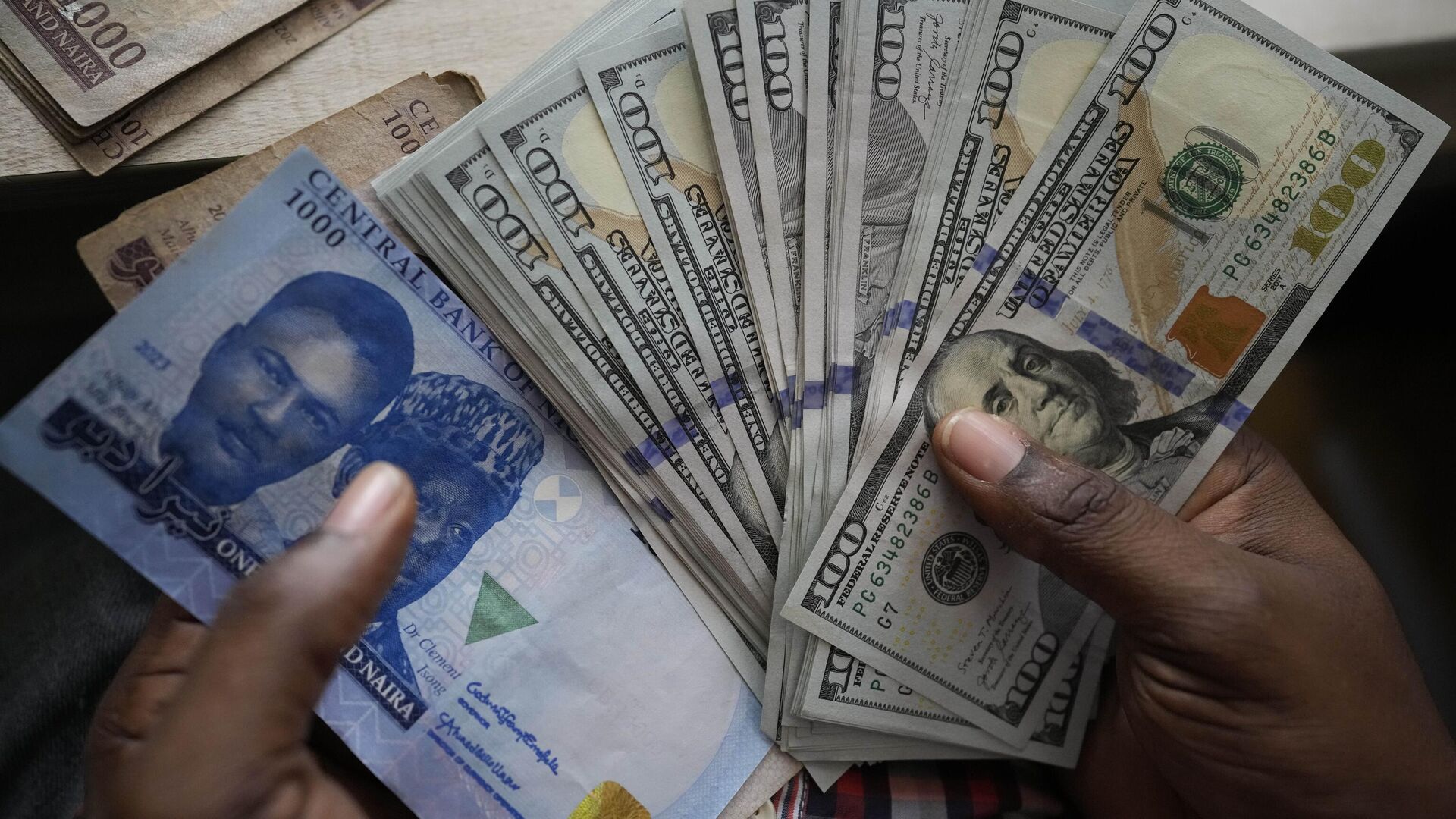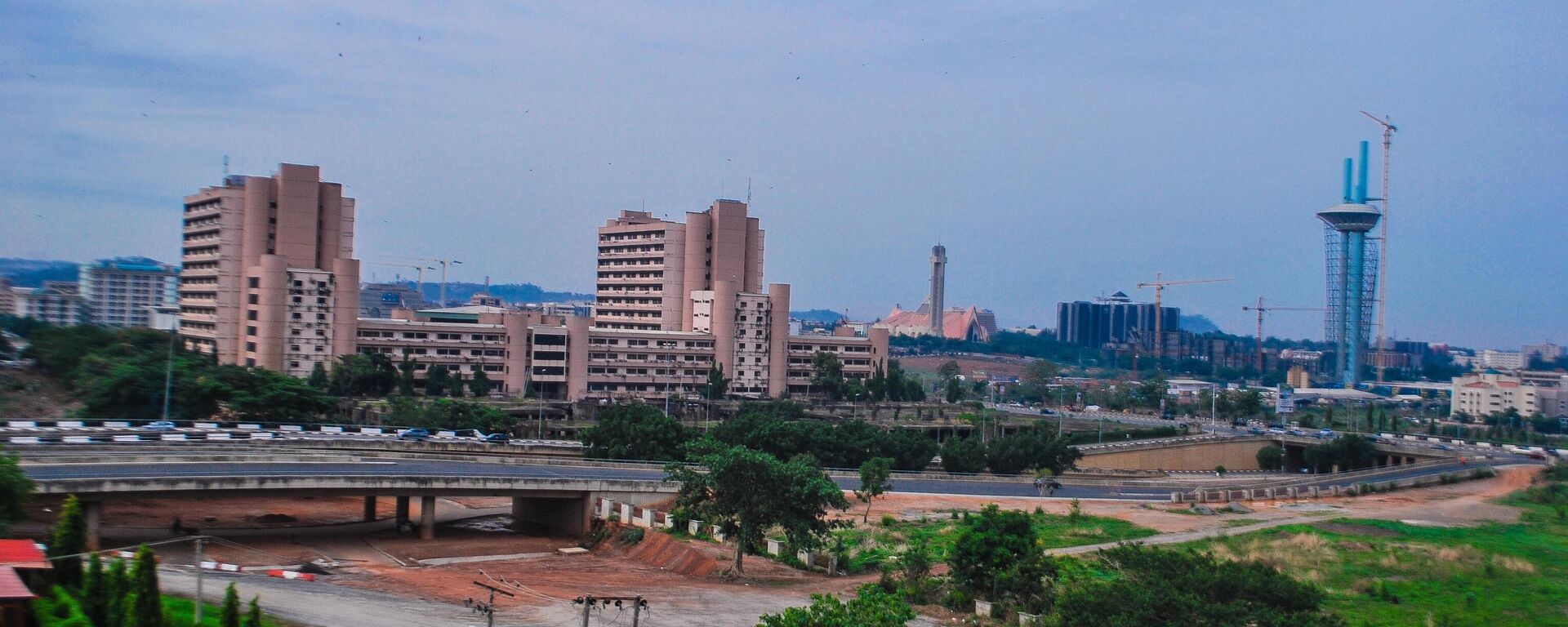https://en.sputniknews.africa/20240422/nigeria-is-reportedly-anticipating-225-billion-loan-from-world-bank-1066181214.html
Nigeria is Reportedly Anticipates $2.25 Billion Loan From World Bank
Nigeria is Reportedly Anticipates $2.25 Billion Loan From World Bank
Sputnik Africa
In late March, Nigeria's central bank adopted yet another reform to boost economic growth: it announced an increase in the capital threshold for operating an... 22.04.2024, Sputnik Africa
2024-04-22T17:35+0200
2024-04-22T17:35+0200
2024-04-22T17:58+0200
sub-saharan africa
nigeria
world bank
african development bank (afdb)
west africa
loan
economy
funding
us dollar
reforms
https://cdn1.img.sputniknews.africa/img/07e7/0a/1f/1063225029_0:160:3072:1888_1920x0_80_0_0_d0db5a84cd4d876128b759b9b62a1416.jpg
Nigeria is expected to get a loan of around $2.25 billion with an interest rate of about 1% from the World Bank, the local media reported last Saturday, citing Nigeria's Minister of Finance Wale Edun.Edun also identified other sources of overseas funding for the Nigerian economy, including diaspora remittances, foreign portfolio investments, a budget assistance facility from the African Development Bank, and other international development partners.Furthermore, Edun talked about the issuance of dollar-denominated securities with a specific focus on Nigerians living abroad and those who had savings in foreign currencies within Nigeria as an additional strategy to attract foreign exchange inflows into the country, the media revealed. He added that the government intends to issue the bonds later this year.In addition, the official emphasized the contributions of the fiscal sector of the economy in supporting the recent monetary policy reforms implemented by the Central Bank of Nigeria (CBN). According to the minister, the Bola Tinubu administration aims to stimulate growth in the medium term by focusing on the agricultural sector. This includes the distribution of fertilizer and seeds to cut food prices and improve food security. Additional initiatives, as reportedly stated by Edun, include: achieving a power generation capacity of approximately 6000 megawatts within six months; improving infrastructure, particularly in the housing sector, to facilitate the availability of low-interest mortgages for Nigerians; revitalizing the social investment program; and implementing a proposed economic stabilization plan.Nigeria has been actively trying to revive its economy since president Tinubu took office last May. For example, last month the CBN said that, in order to incite economic growth, it's raising the capital threshold for operating an international bank to 500 billion naira (about $404.5 million) from 50 billion naira (approx. $40.4 million) previously, while lenders with in-country operations will need 200 billion naira (around $161.8 million) of capital compared with 25 billion naira (more than $20.2 million) before.In addition to traditional reforms like the one described above, Nigeria has also resorted to more unusual ones. At the end of March, local media reported that Tinubu would ban ministers from foreign travel for 90 days starting April 1, due to the rising cost of such trips.
https://en.sputniknews.africa/20240417/nigeria-welcomes-russian-investments-interested-in-expanding-them-budget-office-says-1066110242.html
nigeria
west africa
Sputnik Africa
feedback@sputniknews.com
+74956456601
MIA „Rossiya Segodnya“
2024
Christina Glazkova
https://cdn1.img.sputniknews.africa/img/07e7/0b/07/1063380906_0:0:673:674_100x100_80_0_0_79628b4d0cd9f29291a57aa13bbf9e7a.jpg
Christina Glazkova
https://cdn1.img.sputniknews.africa/img/07e7/0b/07/1063380906_0:0:673:674_100x100_80_0_0_79628b4d0cd9f29291a57aa13bbf9e7a.jpg
News
en_EN
Sputnik Africa
feedback@sputniknews.com
+74956456601
MIA „Rossiya Segodnya“
Sputnik Africa
feedback@sputniknews.com
+74956456601
MIA „Rossiya Segodnya“
Christina Glazkova
https://cdn1.img.sputniknews.africa/img/07e7/0b/07/1063380906_0:0:673:674_100x100_80_0_0_79628b4d0cd9f29291a57aa13bbf9e7a.jpg
nigeria, world bank, african development bank (afdb), west africa, loan, economy, funding, us dollar, reforms, bola tinubu
nigeria, world bank, african development bank (afdb), west africa, loan, economy, funding, us dollar, reforms, bola tinubu
Nigeria is Reportedly Anticipates $2.25 Billion Loan From World Bank
17:35 22.04.2024 (Updated: 17:58 22.04.2024) Christina Glazkova
Writer / Editor
In late March, Nigeria's central bank adopted yet another reform to boost economic growth: it announced an increase in the capital threshold for operating an international bank by 10 times, to 500 billion naira (more than $404.5 million).
Nigeria is expected to get a loan of around $2.25 billion with an interest rate of about 1% from the World Bank, the local media reported last Saturday, citing Nigeria's Minister of Finance Wale Edun.
"We have qualified for the processing just this week to the Board of Directors of the World Bank of a total package of $2.25 billion of what you can call ‘the closest you can get to a free lunch’ — virtually a grant. It’s for about 10–20 years moratorium and about 1% interest," he reportedly said during a press briefing at the World Bank/International Monetary Fund Spring meeting.
Edun also identified other sources of overseas funding for the
Nigerian economy, including diaspora remittances, foreign portfolio investments, a budget assistance facility from the
African Development Bank, and other international development partners.
“In addition, there is a similar budgetary support – low-interest funding from the African Development Bank and, clearly, there are ongoing discussions with foreign direct investors across many sectors,” he was quoted as saying.
Furthermore, Edun talked about the issuance of dollar-denominated securities with a specific focus on Nigerians living abroad and those who had savings in
foreign currencies within Nigeria as an additional strategy to attract foreign exchange inflows into the country, the media revealed. He added that the
government intends to issue the bonds later this year.
In addition, the official emphasized the contributions of the fiscal sector of the economy in supporting the recent monetary policy reforms implemented by the Central Bank of Nigeria (CBN).
According to the minister, the
Bola Tinubu administration aims to stimulate growth in the medium term by focusing on the
agricultural sector. This includes the distribution of fertilizer and seeds to cut food prices and improve food security.
Additional initiatives, as reportedly stated by Edun, include: achieving a
power generation capacity of approximately 6000 megawatts within six months; improving infrastructure, particularly in the housing sector, to facilitate the availability of low-interest mortgages for Nigerians; revitalizing the social investment program; and implementing a proposed economic stabilization plan.
Nigeria has been actively trying to revive its economy since president Tinubu took office last May. For example, last month the CBN said that, in order to incite economic growth, it's
raising the capital threshold for operating an international bank to 500 billion naira (about $404.5 million) from 50 billion naira (approx. $40.4 million) previously, while lenders with in-country operations will need 200 billion naira (around $161.8 million) of capital compared with 25 billion naira (more than $20.2 million) before.
In addition to traditional reforms like the one described above, Nigeria has also resorted to more unusual ones. At the end of March, local media
reported that Tinubu would ban ministers from foreign travel for 90 days starting April 1, due to the rising cost of such trips.



